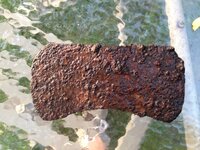elijahhenry10
Sr. Member
- Jan 24, 2012
- 368
- 53
- Detector(s) used
- Fisher F-75
Teknetics Omega 8000
Bounty Hunter Quickdraw II
- Primary Interest:
- Metal Detecting
I actually found this in the spring, but I just now retrieved because I became curious about it. My questions are what is an approximate age ( if possible) and what type? I found this on a home site that was abandoned late 18th century, but people have lived / worked in the general area ever since. Thanks in advance!
Amazon Forum Fav 👍
Attachments
Upvote
0






